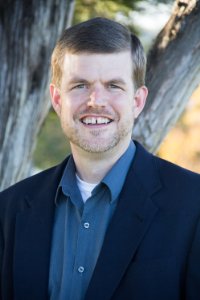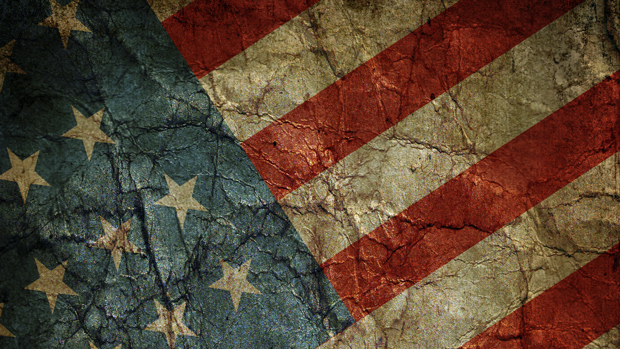For today's entry in the Friday Five interview series, we catch up with Thomas S. Kidd.
Thomas S. Kidd is professor of history at Baylor University, and the author of books including Patrick Henry: First Among Patriots. He is currently writing a biography of George Whitefield for Yale University Press.
Today we chat with Thomas about American history, the misguided temptation to make the Founding Fathers saints, and religious liberties.

You are an evangelical historian, with a particular focus on American history. Why should followers of Christ care about history and particularly American history?
Scripture constantly tells us to remember the past, and especially to remember God's faithfulness to his people. We get unique insight into God's work in history from the Bible, but Christians should also value the history of their own people and nation, seeking to understand how the world they inhabit—in our case, early twenty-first century America—came to be. The past holds deep reservoirs of wisdom which we would be foolish to ignore.
Christians will naturally want to know about the broad history of the church, but American Christians will also be drawn to their specific religious heritage, including the faith of many of the early colonists, the great revivals of the First and Second Great Awakenings, and the role of faith in the American Revolution. My own faith certainly accounts for my professional interest in the religious history of the eighteenth century.
There is a temptation for evangelicals to either sanitize American history, or ignore it. But you call for a third way of knowing, understanding, and learning from our history.
Yes. George Whitefield (the preeminent evangelist of the First Great Awakening and subject of my current book project) spoke of how Christians sometimes make a "pious fraud" out of the heroes of the past. We might be tempted to act as if the people we admire in the past were entirely sanctified saints who never made any mistakes. It is interesting that the Bible never adopts this approach: the great heroes of the faith, from David to Paul, were often also some of the worst sinners.
Some Christians who are also great admirers of the American founding generation are also tempted to fashion the Founding Fathers as exemplary saints, too. This is even more problematic, not only because the Founders weren't all perfect Christians (and, in some cases, weren't Christians at all), but it can turn them into heroes of a quasi-Christian patriotic faith. American civil religion is dangerous and something Christians should avoid, no matter how much they admire the founding generation's accomplishments. Admitting that someone like George Washington was imperfect (he owned slaves and refused to take communion at church, for example) is not only honest, but it helps us remember that all humans, no matter how noble, are flawed by sin and the limits of our culture.
How can a faithful Christian embrace and love their country and yet still have a Great Commission-oriented heart for all nations?
As someone who writes and teaches about American history for a living, it is sobering to remember that, one day, America will cease to exist, while the Kingdom of God will go on forever. In heaven, my identity as an American will likely have very little significance at all, as the great throng composed of people from every "tribe, tongue, and nation" will set aside their ethnic, racial, and historical differences.
Nevertheless, love and pride for the place where God has placed you is natural and healthy. Even if I enlist as a long-term missionary, the place where I was born and raised has still made an indelible mark on who I am. For Americans, studying American history is a little like studying one's autobiography. More particularly, American Christians are deeply indebted to the history of the church in America.
Religious liberty has been in the news the last few years. You've written on the history of religious liberty here in America. Where do you place the current conflicts (HHS mandate, wedding cakes, photographers) in the context of history?
Of all the good contributions that America has made to world history, I believe that religious liberty is perhaps the most significant. As I discussed in my book God of Liberty: A Religious History of the American Revolution, a union of very different kinds of people—from deists to evangelicals—secured religious liberty in the founding era, most obviously in the First Amendment's guarantee of free exercise of religion, and its ban on a national established, tax-supported denomination. Mother England had an established church, as did most of the colonies. Independent America decided for religious liberty instead, with Baptists and evangelicals of other stripes leading the charge.
The vast increase in the size and ambition of the federal government has put a number of freedoms at risk in recent years, not least religious liberty. The HHS Mandate and other controversies raise the question of whether our national government is willing to continue making space for people to exercise their religion freely, or whether a rigid system of federal coercion will overwhelm the Founders' vision of limited government and freedom of conscience.
Most people don't understand that Baptists were one of the principal groups fighting for religious liberty, including heroes like John Leland and Roger Williams. Can you explain?
If religious liberty is one of our greatest national legacies, we can thank many early Baptists for being on the front lines of the fight for that liberty. In the Massachusetts Bay Colony, and later Rhode Island, Roger Williams was one of the first dissenting voices speaking out against a state establishment of religion, and against the state policing people's religious beliefs. (For Williams, religion was too important for the government to meddle in it.) In the era of the Revolution, Baptists emerging from the Great Awakening wanted full freedom to create their own churches and to preach to whomever they wished. In most of the colonies, such freedom was not readily granted.
We forget that at the same time as the fight for independence from Britain, Americans were also fighting for freedom from oppressive religious laws. There were Baptist pastors being fined and even jailed for illegal preaching in Virginia in the early 1770s. Leaders like James Madison, Thomas Jefferson, and Patrick Henry did not just support religious freedom in theory, but pointed to the persecution of the Baptists as a concrete example of why liberty of conscience, and government neutrality toward denominations, was so essential. Jefferson was no evangelical himself, but he formed his views of religious freedom as he watched the plight of Baptists like the great evangelist John Leland, who went on to become one of Jefferson's strongest political allies.
Daniel Darling is vice-president of communications for the Ethics and Religious Liberty Commission. He is the author of several books, including his latest, Activist Faith.









